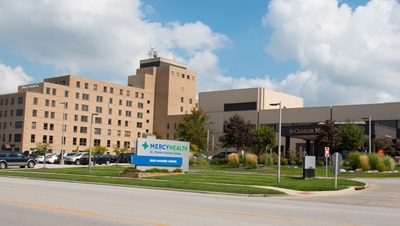Rotations and Curriculum — Psychiatric Pharmacy Residency at St. Charles Hospital
Facilities
 |
Mercy Health – St. Charles Hospital A 250-bed Level III trauma community teaching center, serving residents of Oregon, East Toledo, Lucas, Wood and Ottawa counties. St. Charles provides a comprehensive range of inpatient and outpatient care including emergency, orthopedic, acute rehabilitation and cardiac rehabilitation services. Our hospital features include a birthing center, a sleep center and a women's center. The Behavioral Health Institute is a 90-bed psychiatric facility on the campus of Mercy Health – St. Charles Hospital. Our hospital received the accreditation in stroke care with the Certification for Primary Stroke Center accreditation from The Joint Commission. With a modern facility, St. Charles takes a leadership role in providing quality care and community development. |
Rotation Schedule
Each resident will complete 12 rotational learning experiences that are approximately four weeks in length along with longitudinal rotations. A “Development Plan” for the year is created based on an individual’s entering interests, rotation preferences, areas of prior experience and areas of strength or weakness. Core experiences include general internal medicine, critical care, infectious disease and ambulatory care along with a month of orientation.
Longitudinal rotations include pharmacy practice (staffing), practice management, drug information, research, and a teaching certificate in coordination with Ohio Northern University. Each resident has up to seven additional elective rotations that may include: an additional four weeks of a core rotation, emergency medicine, oncology, infectious disease, nephrology, pediatrics, cardiology, transition of care or psychiatry. During the longitudinal ambulatory rotation residents staff the medication management service four hours each week.
The program has been very flexible in changing the residency experience to accommodate the resident's changing interests and needs. Special interests will be accommodated and encouraged.
- Orientation (4-5 weeks)
- Adult Inpatient Psychiatry I (4-5 weeks)
- Adult Inpatient Psychiatry II (4-5 weeks)
- Adult Intensive Inpatient Psychiatry I (4-5 weeks)
- Consult Liaison Psychiatry I (4-5 weeks)
- Emergency Psychiatry (4-5 weeks)
- Geriatric Psychiatry I (4-5 weeks)
- Substance Use Disorders I (4-5 weeks)
Elective Learning Experiences:
- Adult Intensive Inpatient Psychiatry II (4-5 weeks)
- Forensic Psychiatry (2 weeks)
- Geriatric Psychiatry II (4-5 weeks)
- Neurology (4-5 weeks)
- Outpatient Interventional Psychiatry (2 weeks)
- Pain Management (4-5 weeks)
- The resident will choose three elective experiences
- Additional learning experiences may be created pending preceptor availability and resident interest
Required Longitudinal Experiences:
- Research Project with focus month in December
- Teaching with optional Ohio Northern University Teaching Certificate
- Drug Information
- Pharmacy Practice (Staffing)
- Outpatient Psychiatry
Research and Scholarly Activity
The PGY2 pharmacy resident is required to complete a longitudinal research or quality improvement project. While the resident is expected to be the primary investigator, pharmacy faculty mentors will be assigned to provide guidance based on practice area or topic. Our site also offers assistance with protocol development from an academic research coordinator and with comprehensive literature searches. Scholarly projects are presented at local and national conferences throughout the year.
Additionally, the PGY2 pharmacy resident will co-precept at least one PharmD student, develop a formulary monograph, complete at least one medication use evaluation and present at least one formal educational presentation to health care professionals.
Publications and Presentations
Scott M, Faltin E, Londick K. Exacerbation of neuropsychiatric symptoms in an adult male with influenza A virus treated with oseltamivir. Ment Health Clin. 2024 Dec 2;14(6):339-342. doi: 10.9740/mhc.2024.12.339. PMID: 39703682; PMCID: PMC11616964.